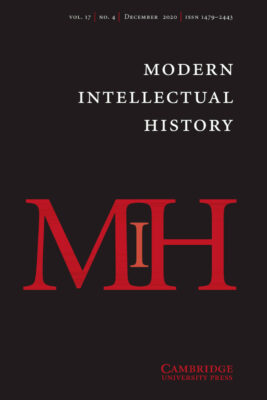 On behalf of the Society for U. S. Intellectual History (S-USIH) and the editors of Modern Intellectual History, we are pleased to announce the recipient of the MIH/S-USIH Graduate Student Conference Paper Prize, for the best paper presented by a graduate student at the 2022 annual meeting in Boston: Ibanca Anand, “Postwar American Economics and the Fate of Countervailing Power.” We are grateful to the prize committee (Benjamin Alpers, Kate Jewell, Manu Goswami, Duncan Kelly, and Tracie M. Matysik) for their diligent work.
On behalf of the Society for U. S. Intellectual History (S-USIH) and the editors of Modern Intellectual History, we are pleased to announce the recipient of the MIH/S-USIH Graduate Student Conference Paper Prize, for the best paper presented by a graduate student at the 2022 annual meeting in Boston: Ibanca Anand, “Postwar American Economics and the Fate of Countervailing Power.” We are grateful to the prize committee (Benjamin Alpers, Kate Jewell, Manu Goswami, Duncan Kelly, and Tracie M. Matysik) for their diligent work.
The committee writes: “Bringing intellectual history and the history of political economy together, the judges thought this study of post-war US economics through the figure of J K Galbraith helped open up onto wider questions about the nature of capitalism, economic expertise, and disciplinary history. It also signalled a return back to the complexities of the 1950s, a period too often relegated now to merely being the prelude to an increasingly powerful libertarian or neo-liberal strand of modern political economy. In combination, this made it an extremely thoughtful piece of reconstructive work.”
Here is Ibanca’s abstract of her paper: “In 1952, Harvard economist John Kenneth Galbraith (1908-2006) published his first book of several to achieve widespread acclaim. In American Capitalism, he argued that the economic system at midcentury had transformed dramatically, and the fundamental assumptions of the neoclassical paradigm could no longer hold. Galbraith offered a theoretical innovation that he believed more closely reflected reality: the concept of countervailing power. The concept’s basic premise—that the power of large corporations could be successfully checked by agglomerations of power on the other side of the market through groups like trade unions and buyers’ associations—suggested an organizational system quite at odds with expectations of free competition and atomized economic agents. Core to the theory of countervailing power was also a vision of an enlightened state that would oversee a fair balance between market groups. To many economists, the idea was blasphemy.
Though the concept was quickly shunned from the mainstream economists’ toolkit, a careful reconstruction of the debate sparked by Galbraith’s book teaches us several lessons about the politically charged world of postwar economics. Taking as its focal point an especially contentious panel at a 1953 annual meeting of the American Economic Association, this paper excavates the discourse surrounding Galbraith’s failed idea. Contrary to the postwar portrait of the discipline as a dispassionate enterprise, analysis of the rhetoric deployed throughout the annual meeting reveals how extensively economic discussions were inflected by fears of totalitarianism and Cold War politics. I argue that such anxieties compelled economists from a variety of political backgrounds, including those who shared Galbraith’s left-liberal politics, to seek common sanctuary in the neoclassical apparatus. Ultimately it was consensus—not antagonism—which spelled the defeat of countervailing power, with significant consequences for the trajectory of economic method and its appetite for political or ethical inquiry thereafter.”
Ibanca Anand is a second-year Ph.D. student at Johns Hopkins University studying the history of 20th century political economy, American intellectual history, and the history of the social sciences. As a former economics and literature double-major, Ibanca is particularly interested in applying a humanistic and literary lens to the history of postwar economics. She holds a B.S./B.A. (with high distinction) from Duke University and an M.Sc. in economic history (with distinction) from the London School of Economics & Political Science. Her first peer-reviewed publication—a paper on Russian-American economist Evsey Domar’s use of historical, comparative, and speculative narratives in his economic works—is due out this summer in a special issue of History of Political Economy.

0